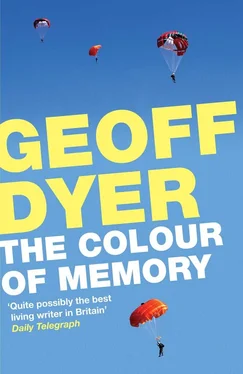I walked home through the park, crossing an empty football pitch and passing through the thin H of rugby posts, noticing the trees and the way the pond endured. Back home there was a letter from the rates office advising me that I didn’t need to attend the Court after all.
I caught boomerang flu, a new bug from Australia — a week after you’ve shaken it off it comes back more virulently than before. I went out, I stayed in and watched ‘The World at War’. During the autumn I’d taped most of the series on a secondhand VCR that I’d picked up in Brixton market and now I often watched two or three episodes straight through: Stalingrad, the Pacific War, Arnhem, the Battle of Britain, the Afriker Korps, B29s, Lancasters, Spitfires, the Eighth Army, an egg frying on the scorched metal of a tank, Orde Wingate, the leeches in Burma, the death railroad, Stukas, panzers, rubble, search-lights dissecting the night sky, the Russian winter, a French collaborator being hit on the legs with a hammer. .
At night I slept in a deep pit of dreams, familiar scenes tinted by the newsreel images of ‘The World at War’: Brixton consumed by the black and white fires of the blitz; Steranko, Foomie, Fran — all of us — on a beach where the sand is white and the water Iwo Jima blue, planes bursting into flames in the clear skies overhead, a charred landscape behind us. I am in the water up to my waist. Everyone else is talking on the beach. Steranko has fallen asleep. As the tide moves up the beach the sea laps over his legs and chest and covers the palette of water-colours lying by his side. When the palette is completely submerged threads of colour — red, yellow, green, blue — drift like smoke in the water until it is dyed a colour that I haven’t seen before. An American pilot bails out of a damaged fighter plane. The parachute fails to open; he disappears into the sea and then the parachute inflates, a white jelly fish with a man tangled in thin tentacles beneath the waves.
As I walked to the bus-stop a woman I’d noticed off and on for a long time finally spoke to me. I’d first seen her a couple of years ago when she looked very bad, as if she hadn’t seen any daylight for six months — thin, white, ill-looking with frightened glasses. Something bad must have happened to her. From time to time I saw her walking along the street; if she had to cross a road she waited on the pavement a long time to make sure there were no cars coming. Once I saw her with a man I presumed to be her father walking beside her slowly and protectively. That was the first time she said hello. A couple of times before that she’d glanced at me timidly but this was the first time she’d actually spoken. I suppose she’d begun to recognise me at about the time that I’d started to recognise her. Since then I’d run into her about once a fortnight and on each occasion she’d said hello more vigorously — more familiarly and confidently — than before. She had pale skin and stunted ginger hair. When I saw her another time she was wearing a little eye make-up. There was something ghostly about her slow regeneration; although she looked much better you could see she was still in a bad way. There are people like that. You see them and your first reaction is ‘what happened?’ She was recovering from something bad that happened, that was for sure. To find out more would be to become involved. I didn’t want our nodding acquaintance to increase.
The last few times we’d bumped into each other she’d taken me completely by surprise and on this occasion, walking to the bus-stop, I didn’t notice her at all until, suddenly, there she was, standing a couple of feet away from me. I knew she was going to speak.
‘You’re very good-looking,’ she said, holding my eyes for several seconds before I could think what to do. I mumbled something and walked on, leaving her standing there. Then I crossed the road quickly.
At the bus-stop I watched her walk away and wished I had smiled and said ‘So are you!’ I thought of calling out to her but it was too late. Instead I concentrated on small things: two milk bottles lying in the gutter, each with a tiny pool of grey milk in the bottom; a car braking hard to avoid a dog padding across the road.
Two other people were waiting for a bus and we took it in turns to stamp our feet and moan. More people showed up. The wind howled as if it longed for the coarse grass of the moor.
Across the road a man in a greasy anorak nipped into the phone booth. He fumbled for change, pressed a few digits which served only to ignite the blue touch paper of his anger and then hurled the phone back into its cradle. While we laughed, he strode off with his anger and rage, tremors of ill-feeling spreading out across the city. Perhaps he’d been trying to phone the Samaritans. In six months’ time maybe he’d buy a shotgun and massacre four people in a sleepy town somewhere and no one would be able to say for sure why he did it, no one would know the part played by the broken phone and the people at the bus-stop laughing.
By now there was a large herd of us huddled round the bus-stop, nourished by the thought that when the bus came we were really going to give the conductor a hard time because we were freezing and late and wished we had the money for a fucking taxi even though you hardly saw any taxis round here.
Phones and buses: part of the war of attrition that the city wages on its inhabitants, part of its attempt to purge itself of citizens and become pure, empty possibility.
We waited another ten minutes and then saw a bus barging its way towards us through the wind.
‘Come on in,’ said the conductor, leaning out to help an old woman with her shopping trolley. ‘It’s nice and warm in here.’
As if he was welcoming her into his home .
The memory of that gesture warmed me for the rest of the day.
I had just got back from the paint shop when the phone started shrieking. It was a market research company wanting to ask about my opinions and habits. I asked them to hang on a moment while I took my coat off. These calls started a couple of months ago when someone telephoned and asked about a dismal new product that I’d never heard of. A couple of weeks later they called back and asked if I would be willing to have my name put on their list of regular interviewees. I said I would be only too pleased and after that the calls started coming fairly regularly. Quite often the interview was closed down after a couple of questions because my habits or income cast me outside the research pool they were interested in. I soon learnt that when it came to the second or third question — ‘Do you have a mortgage?’ or ‘Do you have a car?’ — I should give whichever answer was most likely to enable me to pass through to the next stage of the questionnaire (‘yes’ was usually the best response when it came to mortgages and cars).
Shoulders still aching from carrying the cans of paint I got back to the phone and answered an apparently random series of questions.
Have I heard of Sellafield? Do I know what it does? (I’m not sure: something to do with nuclear fuel — these interviews made you feel really ignorant sometimes.) Do I own a carpet cleaner? Would I like to? How often do I shave? Do I use an electric shaver? Do I wish I did? Have I heard of the new butter that you do not have to spread? (‘Yes!’ I snapped, eager to be of help, ‘Yes!’) Who would I vote for? What do I think are the most important issues of our time? How many times a week do I take exercise? Would I be interested in using a new tummy flab reducer? How many hours’ television do I watch per week? Which programmes?
Читать дальше












